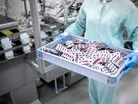COP28 to discuss emission reduction in pharma manufacturing

The climate change conference COP28 will see 70,000 people arrive in Dubai, 30th November – 12th December, with representatives from 197 countries who have signed, or are ‘parties’ to, the United Nations Framework Convention on Climate Change (UNFCCC). In order to prevent global warming to 1.5 degrees Celsius, business leaders across the manufacturing sector will attend to hear ideas and offer solutions. One subject of particular interest, will be pharmaceutical manufacturing. The healthcare sector creates 5% of total greenhouse gas emissions, half of which come from the manufacturing supply chains. Energy used in these supply chains totals 25% of total healthcare emissions.
COP28 spotlight on pharmaceutical manufacturers and reducing carbon emissions
Pharmaceutical manufacturers across the world are looking at their supply chains to find ways to reduce their carbon emissions. Merck has pledged to reduce its Scope 3 emissions by 52% by 2030.
“A lot of people are talking Scope 1 and Scope 2, and we need people to work on it, but for most companies, you’re talking at least 75% to 95% of their footprint sits in Scope 3,” said Jeffrey Whitford, Vice President of sustainability, social business innovation, at Merck. “One of those ways is to change things like the raw material where the solvents are coming from. Instead of using fossil fuel-based materials, can we use a bio-based material?”
China has been a top choice for pharmaceutical manufacturing, due to low labour costs. However, in recent years, manufacturers have looked for risks in their supply chains, in addition to emissions. As a result, manufacturers are diversifying their supply chains from China alone, by manufacturing more products in India. Competition between the two has led to both India and China utilising renewable energy in their production, to become more attractive to manufacturers.
Dr Tedros Adhanom Ghebreyesus, Director-General, World Health Organization, is keen to hasten the move to renewable energy for pharmaceutical manufacturers - especially India and China.
“Globally, the health sector is responsible for approximately 5% of emissions, making it a significant contributor to climate change,” he said. “This progress to accelerate the transition to renewable energy in pharmaceutical manufacturing in China and India is welcome news, and complements WHO’s work through the Alliance for Transformative Action on Climate and Health (ATACH), which brings together governments, the private sector and other partners to build climate-resilient and climate-friendly health systems in countries.”
At Manufacturing Digital LIVE, a free virtual event on Wednesday 6th December 2023, the future of the manufacturing industry will be explored by several speakers.
Register for free here.
*************************************************
Check out our free upcoming virtual event, Manufacturing LIVE, 6th December 2023.
For more insights into Manufacturing - check out the latest edition of Manufacturing Magazine and be sure to follow us on LinkedIn & Twitter.
Other magazines that may be of interest - Healthcare Digital.
*********************************************
BizClik is a global provider of B2B digital media platforms that cover 'Executive Communities' for CEO's, CFO's, CMO's, Sustainability Leaders, Procurement & Supply Chain Leaders, Technology & AI Leaders, Cyber Leaders, FinTech & InsurTech Leaders as well as covering industries such as Manufacturing, Mining, Energy, EV, Construction, Healthcare + Food & Drink.
BizClik, based in London, Dubai & New York offers services such as Content Creation, Advertising & Sponsorship Solutions, Webinars & Events.


